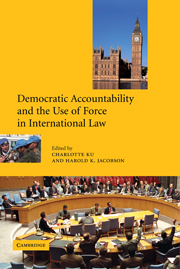Book contents
- Frontmatter
- Contents
- List of figures
- List of tables
- Notes on contributors
- Preface
- List of abbreviations
- I Introduction
- II The domestic and international context
- III Traditional contributors to international military operations
- IV Newcomers to international military operations
- V Permanent members of the UN Security Council
- 11 Russian Federation: the pendulum of powers and accountability
- 12 France: Security Council legitimacy and executive primacy
- 13 The United Kingdom: increasing commitment requires greater parliamentary involvement
- 14 The United States: democracy, hegemony, and accountability
- VI Conclusion
- Appendix A. Uses of military forces under the auspices of the UN and NATO
- Appendix B. Country participation in international operations, 1945–2000
- References
- Index
12 - France: Security Council legitimacy and executive primacy
Published online by Cambridge University Press: 30 July 2009
- Frontmatter
- Contents
- List of figures
- List of tables
- Notes on contributors
- Preface
- List of abbreviations
- I Introduction
- II The domestic and international context
- III Traditional contributors to international military operations
- IV Newcomers to international military operations
- V Permanent members of the UN Security Council
- 11 Russian Federation: the pendulum of powers and accountability
- 12 France: Security Council legitimacy and executive primacy
- 13 The United Kingdom: increasing commitment requires greater parliamentary involvement
- 14 The United States: democracy, hegemony, and accountability
- VI Conclusion
- Appendix A. Uses of military forces under the auspices of the UN and NATO
- Appendix B. Country participation in international operations, 1945–2000
- References
- Index
Summary
Introduction
France has always had a specific approach to the question of the legitimacy of international institutions using force, which can be explained by its historical experience, its place in the UN system as a permanent member of the United Nations Security Council (UNSC), its status as a member of the nuclear club, and its constitutional system. These characteristics are reflected in the meaning generally given by the French to the notion of “accountability.” The word itself cannot be exactly translated into French: it is not “responsabilité” or “évaluation,” but something in between. Democratic accountability in France may be understood as follows: it is the process by which the legitimacy, on the one hand, and the effectiveness, on the other, of a public policy can be assessed.
Understanding accountability requires establishing a distinction between two different levels, the international one and the national (or domestic) one. At the international level, “accountability” means that one must address the legitimacy and the legality of decisions made by international institutions, as well as their ability to deal properly with the challenges involved, and the effectiveness of the corresponding measures and means used to deal with a given situation. At the domestic level, democratic accountability must be assessed with regard to constitutional provisions and practices related to the use of national military forces. In this respect, the Constitution of the Fifth Republic does not make a specific distinction between the unilateral use of French military forces and their use under international mandate or auspices.
- Type
- Chapter
- Information
- Publisher: Cambridge University PressPrint publication year: 2003

